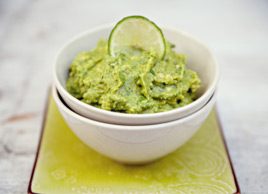5 fatty foods that will help you stay healthy
Always choosing low-fat foods? Don’t fall for the fat-free trap. Instead, choose these sources of healthy fat to feed your body and stay satiated, too

Source: Web exclusive, besthealthmag.ca
Fat isn’t the bad guy. Although we associate dietary fat with weight gain and heart disease, some types of fat are good for us. The key is choosing the right fat and eschewing the bad. Here’s the lowdown on "good" versus "bad" fats’and five great sources of healthy fats everyone should include in his/her daily diet.
"Good" fats vs. "bad" fats
According to the Harvard School of Public Health, when it comes to weight gain or disease, the type of fat you consume is more important than the amount of fat you consume.
"Bad" fats such as trans fat and saturated fat (found in processed food, and, in smaller amounts, red meat and whole-milk dairy) increase your risk of certain diseases like obesity, stroke and heart disease.
"Good" monounsaturated and polyunsaturated fats have the opposite effect. They provide energy, reduce inflammation, improve blood cholesterol levels, stabilize heart rhythms, and play a role in the production of estrogen, testosterone, vitamin D and other important compounds your body needs.
Good fats are also a dieter’s friend because they can help you feel satiated after meals and maintain steady blood sugar levels for longer between meals, says Dr. Melissa Hershberg , author of The Rebel Diet: Break The Rules, Lose The Weight.
Five sources of "good" fats
Hershberg recommends these top sources of healthy fats:
1. Oily fish like mackerel, salmon and sardines
Rich in omega-3 fatty acids (a polyunsaturated fat), these fish are delicious as well as healthy. They have full-flavoured flesh and need just a dash of lemon and sea salt if grilled. Canned versions provide an extra boost of calcium if you eat the soft bones.
2. Seeds and tree nuts
Flax, hemp and salba seeds are high in omega-3s, while almonds and walnuts boast monounsaturated fat. All are easy to add to meals and snacks. Stir a spoonful of seeds into your smoothie, yogurt or cereal or incorporate them into baking recipes. Almonds and walnuts can be tossed into any salad. Almonds cook well too, and adding a handful is a delicious way to beef up vegetarian dishes like stir-fries.
3. Olive oil
Olive oil is a great source of monounsaturated fat. A bottle (choose extra-virgin for the best quality and flavour) should be in every cupboard’use it to make homemade salad dressings and to flavour steamed veggies.
4. Avocado
This fruit is another great source of monounsaturated fat. Mash it with lime juice, salt and pepper to taste, and you’ve got guacamole (add diced onion, chopped tomatoes, and garnish with cilantro and jalapeño for added oomph). Or add sliced avocado to a salad or sandwich.
5. Dark green veggies like broccoli, spinach and kale
Eaten regularly, these veggies provide plenty of omega-3 fatty acids. They’re great lightly sautéed with olive oil and garlic, or can be added to soups and casseroles.
"Good" fat in good portions is a dieter’s best friend
Although good fats are beneficial, you can definitely get too much of a good thing’at least if weight control is a concern, says Hershberg.
"Although fats like the ones mentioned above are healthy, it’s important to watch portion sizes," she says. “This is because fat has more than double the calories of carbs or protein, gram for gram.” Hersheberg notes that while there are nine calories in a gram of fat, a gram of carbs or protein contains only four calories, so you get much more volume for the same amount of energy.
"It’s important to watch nuts," Hershberg adds. "Fifteen almonds is a good portion size for a snack, totaling 100 calories and nine grams of fat."
The upshot: include healthy fats in your diet. But as with anything, don’t go overboard. When it comes to healthy eating, moderation is always key.




